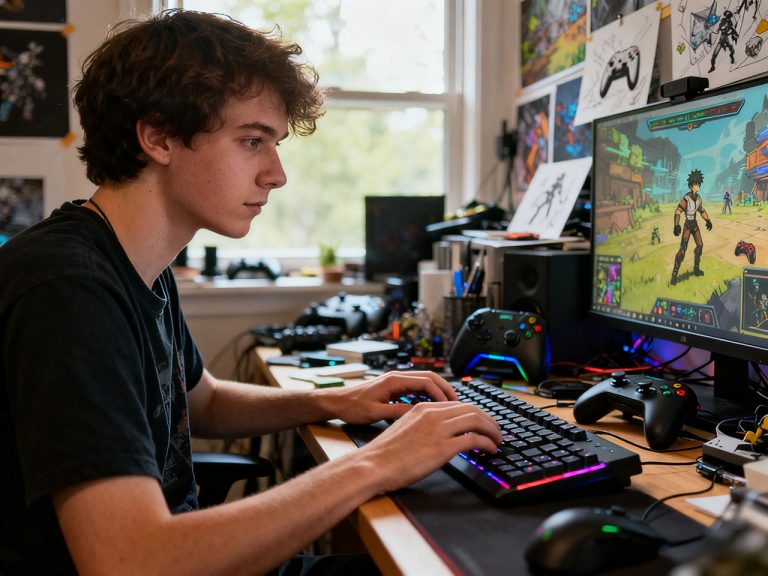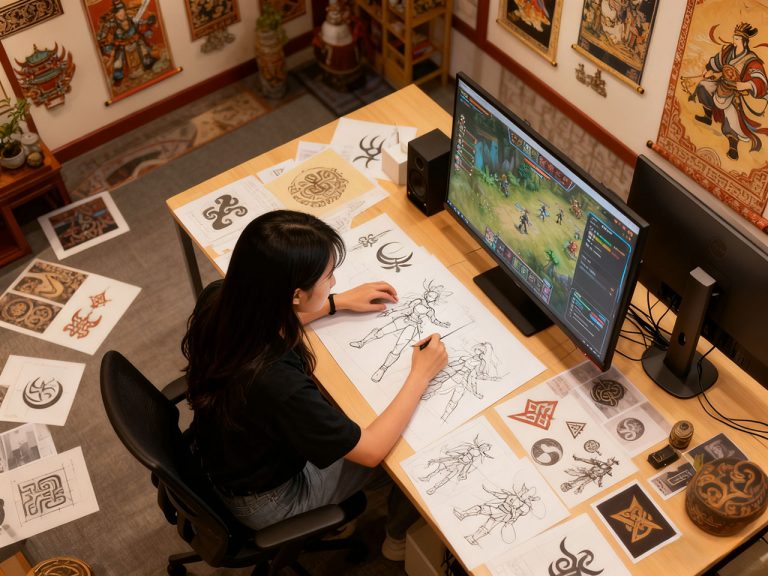
Decoding the Success of Indie Games: What Sets Them Apart in the Competitive Gaming Market
In recent years, the gaming industry has witnessed a surge in the popularity of indie games. These independently-developed games have not only captured the hearts of millions of players worldwide but have also carved a significant niche in the highly competitive gaming market. This blog post delves into the factors that contribute to the success of indie games and explores how they stand out amidst industry giants.
The Rise of Indie Games
The rise of indie games can be attributed to several key factors. Primarily, technological advancements have democratized game development, allowing small teams or even individual developers to create and distribute their games without the backing of large publishers. Platforms such as Steam and GOG have provided indie developers with the ability to reach a global audience, offering equal footing alongside big-budget productions.
Moreover, the increasing accessibility of game development tools and engines, such as Unity and Unreal Engine, has lowered the barrier to entry for aspiring developers. These tools offer robust features that were once exclusive to large studios, empowering indie developers to create high-quality games.
Innovation and Creativity
One of the defining characteristics of indie games is their emphasis on innovation and creativity. Unlike mainstream games, which often adhere to proven formulas to ensure commercial success, indie games are known for their experimental nature. This freedom allows developers to explore unique gameplay mechanics, storytelling techniques, and artistic styles.
Games like “Inside” and “Undertale” exemplify this creative spirit, offering players fresh and immersive experiences that are often absent in AAA titles. Such innovation not only attracts a dedicated fanbase but also garners critical acclaim, further propelling the success of indie games.

Community Engagement
Indie developers often maintain a close relationship with their community, fostering a sense of collaboration and inclusivity. This engagement is facilitated through platforms like Reddit and Discord, where developers can share progress updates, seek feedback, and involve players in the development process.
This direct line of communication not only builds anticipation and loyalty among players but also provides valuable insights for developers. By actively involving the community, indie developers can fine-tune their games based on player feedback, resulting in a product that resonates with its audience.
Unique Storytelling and Artistic Vision
Indie games are often celebrated for their distinctive storytelling and visual aesthetics. Freed from the constraints of mainstream market trends, indie developers can explore unconventional narratives and artistic styles that challenge traditional norms.
Titles like “Night in the Woods” and “Celeste” demonstrate how indie games can tackle complex themes such as mental health and personal growth with nuance and sensitivity. These games often evoke strong emotional connections with players, leaving a lasting impact that transcends mere entertainment.
Financial Viability and Sustainability
Despite operating on smaller budgets, indie games can achieve significant financial success. The lower production costs and smaller team sizes allow indie developers to allocate resources efficiently, resulting in higher profit margins compared to their AAA counterparts. Additionally, indie games often benefit from word-of-mouth marketing and online communities, reducing the need for expensive advertising campaigns.
Platforms like itch.io provide developers with flexible pricing models and revenue-sharing options, further supporting the sustainability of indie game development. This financial viability ensures that indie developers can continue to produce innovative content without reliance on external funding.

The Future of Indie Games
The future of indie games looks promising, as more players seek diverse and meaningful gaming experiences. The continued support from platforms, coupled with advancements in technology, will likely drive further innovation in the indie gaming scene.
As the industry evolves, indie games will continue to push boundaries and challenge conventions, inspiring a new generation of developers and players alike. The success of indie games serves as a testament to the power of creativity and passion in shaping the future of gaming.
Takeaways
In conclusion, the success of indie games is a multifaceted phenomenon driven by innovation, community engagement, unique storytelling, and financial viability. By offering diverse and authentic experiences, indie games have secured a prominent place in the competitive gaming market, proving that creativity and passion can triumph over budget and scale. As the industry continues to evolve, indie games will undoubtedly remain a vital and dynamic force, enriching the gaming landscape for years to come.
While the indie gaming scene is thriving, there are challenges that developers must overcome to sustain their success. One such challenge is visibility in an increasingly crowded marketplace. With thousands of indie games released each year, standing out and capturing the attention of players can be a daunting task. However, indie developers can leverage social media, gaming conventions, and collaborations with influencers to enhance their visibility and reach new audiences.
Another challenge is maintaining the balance between creative freedom and commercial viability. As indie developers experiment with new ideas and concepts, they must also consider market demand and player preferences. Striking this balance requires astute decision-making and a deep understanding of their target audience. Successful indie games often achieve this by staying true to their artistic vision while incorporating player feedback and industry trends.

Furthermore, indie developers must navigate the complexities of game distribution and monetization. While digital platforms have made it easier for indie games to reach a global audience, developers must carefully choose the right platforms and pricing strategies to maximize revenue. Some developers opt for a pay-what-you-want model, while others offer free-to-play games with optional in-game purchases. Each approach has its benefits and drawbacks, and developers must assess what aligns best with their game’s design and audience expectations.
The Role of Crowdfunding
Crowdfunding has emerged as a valuable tool for indie developers, allowing them to secure funding and generate interest before a game’s release. Platforms like Kickstarter and Indiegogo have facilitated the launch of numerous successful indie games by connecting developers with enthusiastic backers. This approach not only provides financial support but also validates the game’s concept and builds a community around it from the outset.
Successful crowdfunding campaigns often rely on transparent communication and compelling storytelling to engage potential backers. Developers must present a clear vision for their game, including gameplay mechanics, art style, and development timeline. By fostering a sense of excitement and involvement, developers can cultivate a dedicated fanbase that champions the game’s success.
Collaborations and Partnerships
Collaborations and partnerships present another avenue for indie developers to enhance their projects. By joining forces with other creatives, developers can access new skills, resources, and perspectives that elevate their games. Collaborative efforts can take various forms, such as co-development, artistic contributions, or cross-promotional activities.
Partnerships with established publishers or distribution platforms can also provide valuable support in marketing, localization, and technical assistance. While maintaining creative autonomy is crucial for indie developers, strategic partnerships can offer the expertise and infrastructure needed to reach a wider audience and achieve long-term success.
The Impact on Gaming Culture
Indie games have made a profound impact on gaming culture, influencing both players and developers across the globe. They have challenged the notion of what games can be, broadening the scope of interactive storytelling and artistic expression. By offering diverse perspectives and exploring unconventional themes, indie games have contributed to a more inclusive and dynamic gaming landscape.

Moreover, indie games have inspired a new generation of developers who are driven by passion and creativity rather than commercial success. The indie movement has fostered a sense of community and collaboration, encouraging aspiring developers to pursue their dreams and share their unique stories with the world.
Final Thoughts
The success of indie games in the competitive gaming market is a testament to the power of innovation, creativity, and community engagement. As more players seek authentic and diverse gaming experiences, indie games will continue to thrive and shape the future of the industry. By embracing the challenges and opportunities that come their way, indie developers can continue to create compelling and impactful games that resonate with players worldwide.
As we celebrate the achievements of indie games, it is essential to support and nurture the indie community, recognizing their contributions to the gaming landscape. Whether through playing, sharing, or backing their projects, players can play an active role in fostering the growth and success of indie games for years to come.
Supporting indie games goes beyond merely purchasing and playing them. It involves actively participating in discussions, providing constructive feedback, and promoting the games within personal networks. Social media platforms, gaming forums, and community events offer excellent opportunities for players to engage with indie developers and fellow enthusiasts. By sharing experiences and insights, players can help spread the word about exceptional indie titles and encourage others to explore these unique offerings.
Moreover, players can participate in beta testing phases, offering valuable feedback that developers can use to refine their games. This collaborative approach not only improves the final product but also strengthens the bond between developers and their audience. When players feel invested in a game’s development journey, they become more than just consumers; they become ambassadors who advocate for the game’s success.
Educational Initiatives and Indie Games

Indie games have also found a place within educational settings, where they are used as tools for teaching and learning. Many indie games are praised for their ability to convey complex concepts and foster critical thinking skills. Educational institutions have begun to recognize the potential of indie games to engage students in subjects such as history, science, and mathematics.
For example, games like “Kerbal Space Program” have been used to teach physics and engineering principles, while “Papers, Please” offers insights into political and ethical dilemmas. By incorporating indie games into curricula, educators can create dynamic and interactive learning experiences that resonate with students and encourage them to explore new perspectives.
Conclusion: The Enduring Legacy of Indie Games
As we reflect on the success of indie games, it is clear that their impact extends far beyond the gaming industry. They have redefined what it means to be a game developer, proving that passion, creativity, and perseverance can triumph over conventional barriers. Indie games have also enriched player experiences, offering diverse narratives and innovative gameplay that challenge preconceived notions of gaming.
Looking to the future, the indie game movement shows no signs of slowing down. As technology continues to evolve and the gaming community grows more diverse, indie developers will remain at the forefront of innovation, inspiring future generations of creators and players alike. By continuing to support and celebrate indie games, we contribute to a vibrant and inclusive gaming ecosystem that values creativity and exploration.
In the end, indie games are more than just entertainment; they are a testament to the power of human imagination and the enduring spirit of innovation. Whether you’re a player, a developer, or an educator, there’s a place for you in the indie gaming community, where creativity knows no bounds, and every story has the potential to inspire and captivate.






